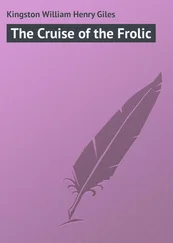William Kingston - Antony Waymouth - or, The Gentlemen Adventurers
Здесь есть возможность читать онлайн «William Kingston - Antony Waymouth - or, The Gentlemen Adventurers» — ознакомительный отрывок электронной книги совершенно бесплатно, а после прочтения отрывка купить полную версию. В некоторых случаях можно слушать аудио, скачать через торрент в формате fb2 и присутствует краткое содержание. Жанр: foreign_prose, foreign_children, на английском языке. Описание произведения, (предисловие) а так же отзывы посетителей доступны на портале библиотеки ЛибКат.
- Название:Antony Waymouth: or, The Gentlemen Adventurers
- Автор:
- Жанр:
- Год:неизвестен
- ISBN:нет данных
- Рейтинг книги:4 / 5. Голосов: 1
-
Избранное:Добавить в избранное
- Отзывы:
-
Ваша оценка:
- 80
- 1
- 2
- 3
- 4
- 5
Antony Waymouth: or, The Gentlemen Adventurers: краткое содержание, описание и аннотация
Предлагаем к чтению аннотацию, описание, краткое содержание или предисловие (зависит от того, что написал сам автор книги «Antony Waymouth: or, The Gentlemen Adventurers»). Если вы не нашли необходимую информацию о книге — напишите в комментариях, мы постараемся отыскать её.
Antony Waymouth: or, The Gentlemen Adventurers — читать онлайн ознакомительный отрывок
Ниже представлен текст книги, разбитый по страницам. Система сохранения места последней прочитанной страницы, позволяет с удобством читать онлайн бесплатно книгу «Antony Waymouth: or, The Gentlemen Adventurers», без необходимости каждый раз заново искать на чём Вы остановились. Поставьте закладку, и сможете в любой момент перейти на страницу, на которой закончили чтение.
Интервал:
Закладка:
“Briefly I will reply,” said Raymond. “At school and college. The learned University of Oxford is my alma mater , and even now I am debating to what profession to devote my energies – the law, the Church, or physic. Sometimes I fancy public life, or to seek my fortune at court, where I have kindred who might aid me; but yet, in truth, I am undecided.”
“Ah, that’s good,” exclaimed Waymouth with animation. “The law – to persuade your hearers that black is white, and to set men by the ears – let that alone an’ you value your soul.”
It is not surprising that the young seaman should give expression to a vulgar and ignorant prejudice against one of the most necessary of professions.
“Physic! ‘Throw physic to the dogs, I’ll none on’t,’ as Will Shakespeare has it,” continued Waymouth. “No, no, Ned, learn not to murder thy friends and those that trust thee. As to the Church, I’ll say nothing against that if thou hast a calling to the ministry. To care for the soul’s welfare is a noble office, but if sought for the sake of filthy lucre it’s a mean, despicable trade, so we hold who follow the sea. And then thou talkest of seeking thy fortune at court. As well seek it on the slippery ice. No, no; listen to me, Ned. Seek it with us. It’s a secret as yet, and I cannot tell thee particulars; but this much I may say. There is as bold an adventure even now preparing as ever set forth from these shores. Hark, Ned: I know that thou art trustworthy. It is for the far-off lands of India, Cathay, the Spice Islands, and maybe the wide Pacific, where many a richly laden galleon or Portugal ship may be fallen in with. Become an adventurer with us. Our lists are not filled up. Think that in two or three short years, at most, thou wilt become for certain a man of wealth, fit to wed the proudest lady in the land. Then the wonders of those distant lands! They make no more count of gold and silver, of diamonds and other precious stones, than we do of tin and iron, and of pebbles from the seaside. Come, come, Ned; say yes to my proposal.”
But Raymond did not say yes, and Waymouth continued in the same strain for some considerable time longer. At length Raymond answered, while the colour mantled on his cheeks —
“I would fain go with thee, good coz, but the truth is, there is one I love here in England from whom I could not bear to be parted. We trust to wed some day, and all my hopes of happiness on earth are bound up in her.”
“Ha! ha! I might have thought so,” said Waymouth. “That comes of living on shore. Now at sea we have no time for thinking of such matters. I doubt not, however, that the fair one, whoever she may be, is worthy of your love. Tell me, do I know her?”
“It is no secret – she is the Lady Beatrice Willoughby. Her grandfather was that noble captain who perished in the attempt to discover a passage to Cathay by the north-west. You have doubtless heard the tale – how he and all his men were found frozen to death in the icy sea, the admiral seated in his cabin, his pen in his hand, his journal before him.”
“Ay, that have I, and reverence his name,” said Waymouth with feeling. “But what fortune hast thou, coz, to support a wife? They say these ladies of fashion are not content unless they have their coach, their running footmen, and their waiting-women, and I know not what else beside.”
Raymond sighed. “My fortune is to be made – I live on hope,” he answered.
“Such often maketh the heart sick and the body lean,” replied the young sailor. “Follow my advice. Go tell the Lady Beatrice the truth. Vow eternal constancy, and comfort her with all the soothing speeches thou canst make, and I’ll warrant that, in three short years at furthest, thou wilt return with wealth sufficient to support a wife as becomes your family and hers.”
There can be no doubt that Antony Waymouth spoke what he believed to be the truth, and gave, as he fancied, excellent advice. It may appear surprising, however, that Raymond, a scholar and a man of good parts and judgment, should have been so strongly influenced as he was by the arguments of a mere youth; but, as far as acquaintance with the world was concerned, Waymouth was the oldest of the two. He had been left since a child almost to work his own way in the world, helped onward by the queen, and had mixed with every variety of men. This gave him a confidence in himself and an independence of manner which Raymond had had no opportunity of gaining.
While the young men were still eagerly talking, a clock from a neighbouring tower struck the hour of one past noon. Waymouth started up with an exclamation of astonishment, saying —
“The hours have sped faster than I thought. I should have been aboard by this time to see how the artificers get on with their fittings. But come, coz, you shall be my excuse, and I’ll show thee as stout ships as ever sailed the salt ocean.”
“Agreed,” was the answer, and the two friends set off. All the way Antony plied his companion with the most glowing descriptions of the wealth and fortune to be obtained in the distant East, not to speak of the honour, and glory, and renown. Portugal ships and Spaniards without number were sure to be taken, even should the land fail to, yield what might be expected. And then the wonders to be seen – the curious people – the palaces of silver and precious stones – the Great Mogul on his throne of gold, and the Emperor of Cathay, with his robes of rubies and diamonds – not to speak of the possibility of falling in with Prester John, whose dominions were undoubtedly on that side of Africa; and then the Spice Islands, which might be discerned by their fragrance even when miles away!
Enlarging, as Waymouth did, with an eloquence which perfect confidence in the truth of what he was saying gave him, and a strong desire to gain over his friend, it is not surprising that Raymond yielded to such seductive arguments, and began to grow eager to join the expedition as an adventurer. Aboard the ships which were fitting in the harbour, Waymouth introduced him to several other adventurers, who naturally wished to obtain a gentleman of such good parts and family as a brother in their company. Raymond had, he fancied, a small patrimony at his command. Could he do better than risk it in so promising an adventure, and in three short years come back and marry his beloved Beatrice? Still he would do nothing rashly; he would make no engagement till he had talked the matter over with her. Accordingly, leaving Waymouth on board to attend to his nautical duties, early next morning he took horse and set off for Exeter, in the neighbourhood of which city the Lady Willoughby, with her daughter and the rest of her family, resided.
Raymond was welcomed as he always was, but he could not bring himself at first to announce the object of his visit. He spoke, however, of his meeting with Waymouth, and of his descriptions of the wonders of the East, and the wealth to be speedily obtained in those distant seas. His auditors were even more interested than he expected. It was but natural that young Hugh Willoughby should be so, but so likewise was Hugh’s uncle, Sir John Jourdan, a brother of Lady Willoughby’s, and guardian to her children.
The early dinner over, Raymond and Beatrice wandered forth into the grounds, for they were acknowledged lovers, and enjoyed a liberty which would otherwise have been denied them. Raymond saw at once that Beatrice was sad at heart. He felt tongue-tied. She spoke first.
“I know what has been passing in your mind, dear Edward. You long to join these adventurers, and I know why – for the sake of the wealth you hope to obtain.”
She gazed tenderly at him, her blue eyes suffused with tears. Beatrice was fair and graceful. Raymond thought her beauty faultless: so did many others. How could he withstand such an appeal? He acknowledged that she was right in her conjectures, but expressed himself ready to be guided by her decision.
Читать дальшеИнтервал:
Закладка:
Похожие книги на «Antony Waymouth: or, The Gentlemen Adventurers»
Представляем Вашему вниманию похожие книги на «Antony Waymouth: or, The Gentlemen Adventurers» списком для выбора. Мы отобрали схожую по названию и смыслу литературу в надежде предоставить читателям больше вариантов отыскать новые, интересные, ещё непрочитанные произведения.
Обсуждение, отзывы о книге «Antony Waymouth: or, The Gentlemen Adventurers» и просто собственные мнения читателей. Оставьте ваши комментарии, напишите, что Вы думаете о произведении, его смысле или главных героях. Укажите что конкретно понравилось, а что нет, и почему Вы так считаете.












